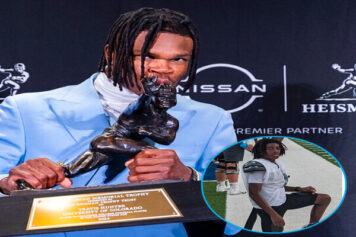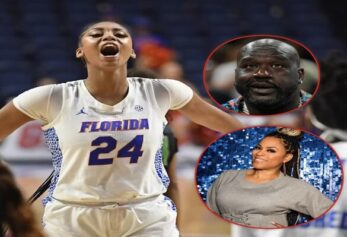In many industries, investment banking for example, when an African-American is hired to a lofty, “running the show” position, it’s usually still, unfortunately, a rarity. Such is the case in FBS football, where there are only 15 black head coaches among the 124 colleges, and the majority of them coach for universities with few resources and even slimmer chances of winning.
On the surface, gains are being made. There were only 5 in 2008. The past few seasons were considered highpoints with the addition of six new black head coaches at FBS schools before the 2010 season.
The hiring of Jon Embree at Colorado, Darrell Hazell at Kent State, Don Treadwell at Miami (Ohio), David Shaw at Stanford and James Franklin at Vanderbilt, brought the number of AfricanAmerican head coaches slated to start the 2011 season to a record 18.
Just as quickly as these coaches get hired, they often get fired. The snake pit of played-out cultural philosophies and improbable odds can require a superhuman coaching effort for them to keep these jobs. It looks like it’s going to take a Jackie Robinson of college coaches to win it all for these attitudes to change. It’s not blatantly visible until an incident like the firing of Colorado coach Jon Embree, thrusts race into the forefront.
Embree struggled to a 4-21 record in his two seasons at Colorado. Based on his failures, the school had legit grounds for kicking him to the curb. The 1-11 record he posted this year, was the worst in the school’s 123-year history. A lot of people felt the firing was too soon, considering Embree cared deeply for his alma mater and was successfully replenishing the talent pool and morale following previous coach Dan Hawkin’s 19-39 tenure. He just wasn’t getting it done on the field. Buffs coaching legend Bill McCartney accused Colorado of straight up racism. And acknowledged the unlikelihood of Embree getting another FBS gig. Former Notre Dame coach Tyron Willingham is the only black coach to ever get fired from a FBS team and hired by another. McCartney posited that he benefited from that racism in reverse when he was given a contract extension in 1984, after winning just seven games in his first three years with the program.
"Honestly, I believe it's because I'm Caucasian. I believe black men have less opportunity, shorter time if you will," McCartney told ESPN radio in Denver. "It's just like, Dan Hawkins got five full years, “McCartney griped. “Why not give Jon Embree five years? Men of color have a more difficult road to tread. It didn't happen to me. Why should it happen to a black man?"
McCartney might sound like one of the Stop the Violence All-Stars kicking “Self Destruction,” but he asked the right question. Many white coaches get a chance to lose some games, but eventually, make the program a winning one. The opportunities for black coaches have been few, and the experiences have been brief.
The passion in Embree’s eyes at his press conference reflected his love for football and mentoring. The tears represented the pain of failure. The defiance reflects the shock of what he and many others felt, was a raw deal.
He’s not the first black coach to get the quick hook. Turner Gill turned a janky Buffalo team into College Bowl players. Gill, was a favorite for the coveted Auburn position in ‘09, but lost out to the white Gene Chizik. The hiring prompted TNT basketball analyst Charles Barkley to bash Auburn as racists. Chizik was just 5-19 in his previous job at Iowa State, but was able to capitalize on Auburn’s plentiful resources and win a National Championship with Cam Newton in 2010, before going 3-9 and being fired this season.
After a rocky two-years at Kansas, Gill is fighting for his coaching life as the new head coach at Liberty University, an unheralded FCS program.
Tyrone Willingham, the first black head coach at Notre Dame, arrived from Stanford sporting an 81-44 record, and was confident he’d rejuvenate an iconic football program. Willingham had 10 wins his first season, six in his third and didn’t make it to a fourth. Some felt his firing was premature, considering he posted a better record than the previous three white coaches. Willingham’s next stop was a struggling Washington program and his career flat-lined with a 0-12 season in ’08.
Sylvester Croom was the first African-American to be the head coach at an SEC school when he coached Mississippi State from 2004 to 2008. In a situation all too familiar, Croom inherited a program that was rife with losing and NCAA sanctions. During his tenure, he won an AP SEC Coach of the Year award and brought dignity to the program. Following a 4-8 season in ’08, school officials told Croom to step off.
Embree‘s familiarity with these type of situations was probably why his press conference was more like a funeral. Like Embree said, “We (black coaches) don’t get second chances.”
The statistics back it up. Willingham is the lone black coach to be fired by a BCS program and hired by another. But to blame Embree’s plight solely on racism is kind of’ played out. The pressure to win affects all coaches. It’s safe to assume that Embree wouldn’t be jobless if he won at CU.
College football is a billion-dollar industry. The availability of sneaker and TV deals and Bowl money – which feeds competitiveness, attractability and rising coach’s salaries – creates colossal pressure to win.
Dr. Fitz Hill dealt with this pressure as head coach at San Jose State from 2001 to 2004. Hill, with San Jose Mercury News columnist Mark Purdy, wrote an in-depth book on the subject, Crackback! How College Football Blindsides the Hopes of Black Coaches.
He says every college football coach has a short window to win and goes on to clarify that it’s just “worse when you’re a black unsuccessful coach.” After going 14-33, Hill was forced to resign as the Spartans' coach in 2004.
"We're in an age today where money is starting to dictate the patience people have, more than ever," Hill, currently the president of Arkansas Baptist College, said in a recent Denver Post article."I think the interesting thing about it is that when an institution terminates an African-American football coach, very rarely will it hire another African American football coach. Oftentimes, African-American coaches are evaluated collectively, whereas white coaches are evaluated individually.”
With so much dough up for grabs, university heads tend to play the race familiarity game and just hire whom they are comfortable with. Any potential for change from that ideology begins at the top.
Conference Commissioners set the agendas for their conferences and are the leaders on issues such as diversity in sports. The 2010 College Racial and Gender Report Card, issued by The Institute for Diversity and Ethics in Sport (TIDES) at the University of Central Florida, is a watchdog for equity in racial and gender hiring practices in athletics. The study's principal author, Richard Lapchick, says the diversity statistics in college football are still “an embarrassment” and that colleges – especially the football programs — are slacking.
The 2011 report confirmed that 90 percent of FBS Presidents and 100 percent of the 11 FBS conference commissioners were white males. Conference commissioners and BCS heads are considered top taste makers in college sports. In all of Division I, excluding the HBCUs, all 30 Division I conference commissioners were white. It doesn’t take a leap to suggest that, if the people directly effecting the hiring are all white, there could exist – for a variety of non-nefarious reasons – the inclination to favor white candidates.
The same applies to athletic directors, who are also influential in hiring coaches. Eighty-eight percent of FBS ADs are white and the offensive and defensive coordinators they hire are only represented by 11.9 percent African-Americans, making the “pipeline” to head coaching gigs slimmer than the new Kerry Washington.
The NFL has already acknowledged the problem and legislated fairness into its hiring practices with the “Rooney Rule,” which requires NFL teams to interview at least one minority for a vacant head coach position. While only 14.5 percent of FBS coaches are black, 10 of the 32 NFL teams (31 percent), have brothers at the helm. Such a rule would be harder to implement among the 124 schools, but Lapchick also noted that the NCAA continues to offer optional diversity management training to whatever universities may want it.
One of the most important factors in hiring football coaches is one Lapchick left out. In a revealing excerpt from his book, posted on thepostgame.com, Hill says the “most critical constituency a college coach has to please is boosters, the fat cats who support football teams at universities across the country, often in a big way – by writing out big checks”.
Hill notes that some of these boosters are hometown hillbillies with a lot of money, but little sensitivity or sophistication concerning race. He mentions Texas coach Mack Brown and Frank Beamer of Virginia Tech, as successful white coaches, who struggled early in their careers, but because of forgiving boosters, were given second jobs with more talented schools and eventually succeeded.
Brown compiled an 8-24-1 record in his first three seasons as North Carolina's head coach, including back-to-back 1-10 seasons. Beamer lost 21 of his first 24 games, before making Virginia Tech a big deal.
Hill’s book excerpt also mentions situations with San Jose State boosters who initiated racially insensitive conversations with him. He had to eat it and keep smiling. The boosters basically control many of the decision-making processes at colleges because they pay the cost to be a boss. And, in turn, they influence the decision making by donating millions for recruiting, coach’s salaries and enhanced facilities. Coaches seeking long term success have to endear themselves to the boosters and recruits. That necessary interaction is also what scares some universities from hiring African-Americans, fearing that the cultural differences between coaches and some boosters and recruits may lead to a hesitance to embrace the school. They just don’t want to risk going outside of the conventional hiring box.
In Judging a Book by Its Cover: Examining the Role of Race in the Intercollegiate Athletic Recruitment Process, a study conducted by Bowling Green State University professor Dr. Amanda L. Paule, a number of anonymous collegiate coaches polled, felt that race could play a role in the decision.
The recent success of coaches like Texas A&M coach Kevin Sumlin, Louisville’s Charlie Strong and Stanford’s David Shaw, indicate a trend towards universities bucking their fears and hiring more black coaches and giving current coaches second chances at better schools.
Sumlin is the first black head coach at a major football school in the state of Texas, giving the SEC three black head coaches. He has the talent, timing and team, to be the Jackie Robinson of college coaches, win a national chip and open the flood gates. Most black coaches have to take any job just to get a foot in the door. Sumlin, who started as a graduate assistant at Washington State, is known as the first bonafide “hot” black coaching prospect.
From 1991-2007, he bounced around as an assistant and, in 2008, he got his first head coaching job at Houston. Together, he and QB Case Keenum led the high-powered Cougars to a 35-17 record in four seasons. By the time he was done there, Sumlin had a list of suitors including Pac-12 powers UCLA and Arizona State. His 10 wins is a record for first-year coaches at the school.
The next logical step is for one of these coaches to win a national championship. Reaching college football’s pinnacle could finally move race closer to a non-issue.



